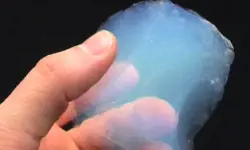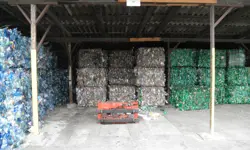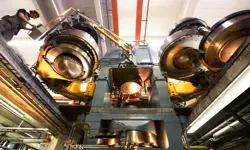
The bioplastic that is easily moulded for repairs

FORMcard is small enough to fit in a wallet. Once heated, it becomes sticky and pliable, allowing it to be moulded into various shapes before hardening © FORMcard
FORMcard is a colourful credit-card-sized piece of bioplastic that melts in boiling water and can then be moulded when hot and pliable to fix a number of items, from screwdrivers and toys, to car wing mirrors and bumpers.
Designer Peter Marigold has worked on gallery displays, installations and public art projects. After becoming interested in plastics that melt at low temperatures and looking at how they could be adapted to be used in the home, he developed the idea for FORMcard.
The cards are produced entirely in the UK and are made from a high-molecularweight thermoplastic linear polyester derived from a bioplastic monomer. The thermoplastic is non-toxic and uses powder pigments instead of universal pigments containing styrenes, which can be hazardous to humans. These types of thermoplastics are usually supplied as granules, which have to be squashed together before using and result in a bulky piece of plastic. It isn’t convenient for people to carry round bags of the granules with them, so FORMcard aims to be easier to use and more accessible so that people can make their repairs wherever they are.
The reusability and accessibility of FORMcard aims to provide people with a simple fix for their items rather than them having to be thrown away, so it is an eco-friendly and sustainable solution
When it is very hot, the plastic becomes sticky and can stick to other plastics, such as ABS (acrylonitrile butadiene styrene), polyester, vinyl and acrylic, allowing it to fix and modify items. Once the plastic cools down slightly, it loses its stickiness but can still be moulded into various shapes before hardening, such as mobile phone stands or wall hooks that can hold up to 10 kg. It can be reheated and, once it has served its purpose, melted again and used to fix something else.
The reusability and accessibility of FORMcard aims to provide people with a simple fix for their items rather than them having to be thrown away, so it is an eco-friendly and sustainable solution. Since it went on sale in December 2015, more than 60,000 FORMcards have been sold and agreements have been made with distributors in New Zealand, Australia, South Africa and the USA.
For more information, see formcard.com
***
This article has been adapted from "The quick fix day solution", which originally appeared in the print edition of Ingenia 67 (June 2016).
Keep up-to-date with Ingenia for free
SubscribeRelated content
Materials

What are aerogels?
Among some of the lightest known solid materials, aerogels, formed by removing liquid from gels, have many uses ranging from catalysts and sensors, to being used on NASA missions.

Recycling household waste
The percentage of waste recycled in the UK has risen rapidly over the past 20 years, thanks to breakthroughs in the way waste is processed. Find out about what happens to household waste and recent technological developments in the UK.

Diamond technology: beyond hardness
Diamond is being used in an increasing variety of industrial and technological applications, due to other properties in addition to its hardness. The UK is home to a wide range of diamond research, development and synthetic diamond production activities.

A lot more than lubrication
The control of friction and wear in mechanical systems by lubrication and surface engineering has led to safer, faster transport as well as medical innovations. Ian Hutchings FREng, GKN Professor of Manufacturing Engineering at the University of Cambridge, highlights the progress and some failures of the important discipline of tribology.
Other content from Ingenia
Quick read

- Environment & sustainability
- Opinion
A young engineer’s perspective on the good, the bad and the ugly of COP27

- Environment & sustainability
- Issue 95
How do we pay for net zero technologies?
Quick read

- Transport
- Mechanical
- How I got here
Electrifying trains and STEMAZING outreach

- Civil & structural
- Environment & sustainability
- Issue 95